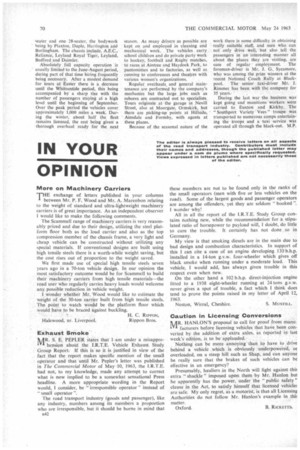IN YOUR OPINION
Page 72

If you've noticed an error in this article please click here to report it so we can fix it.
More on Machinery Carriers 1HE exchange of letters published in your columns
between Mr. P. F. Wood and Mr. A. Marenbon relating to the weight of standard and ultra-lightweight machinery carriers is of great importance. As an independent observer I would like to make the following comments.
The Scammell range of machinery carriers is very reasonably priced and due to their design, utilizing the steel platform floor both as the load carrier and also as the top compression member of the chassis frame, a very light and cheap vehicle can be constructed without utilizing any special materials. If conventional designs are built using high tensile steels there is a worth-while weight saving, but the cost rises out of proportion to the weight saved.
We first made use of special high tensile steels seven years ago in a 70-ton vehicle design. In our opinion the most satisfactory outcome would be for Scammell to build their machinery carriers from high tensile materials—the road user who regularly carries heavy loads would welcome any possible reduction in vehicle weight.
I wonder whether Mr. Wood would like to estimate the weight of the 30-ton carrier built from high tensile steels. The point to watch would be the platform floor which would have to be braced against buckling.
H. C. RIPPON,
Halewood, nr. Liverpool. Rippon Bros.
Exhaust Smoke MR. S. E. PEPLER states that I am under a misappre hension about the I.R.T.E. Vehicle Exhaust Study Group Report If this is so it is justified in view of the fact that the report makes specific mention of the small operator and that until Mr. Pepler's letter was published in The Commercial Motor of May 10, 1963, the I.R.T.E. had not, to my knowledge, made any attempt to correct what is now implied to be a somewhat sensational Press headline. A more appropriate wording in the Report would, I consider, be "irresponsible operator" instead of " small operator ".
The road transport industry (goods and passenger), like any industry, numbers among its members a proportion who are irresponsible, but it should be borne in mind that B42 these members are not to be found only in the ranks of the small operators (men with five or less vehicles on the road). Some of the largest goods and passenger operators are among the offenders, yet they are seldom booked ". 1 wonder why!
All in all the report of the I.R.T.E. Study Group contains nothing new, while the recommendation for a stipulated ratio of horsepower to payload will, 1 doubt, do little to cure the trouble. It certainly has not done so in Germany.
My view is that smoking diesels are in the main due to bad design and combustion characteristics. In support of this I can cite a case of an engine developing 130 b.h.p. installed in a 14-ton g.v.w. four-wheeler which gives off black smoke when running under a moderate load. This vehicle, I would add, has always given trouble in this respect even when new.
On the other hand a 102 b.h.p. direct-injection engine fitted to a 1938 eight-wheeler running at 24 tons g.v.w. never gives a spot of trouble, a fact which I think does tend to prove the points raised in my letter of April 12, 1963.
Neston, Wirral, Cheshire. S. MUSTILL.
Caution in Licensing Conversions mR. HANLON'S proposal to call for proof from manu facturers before licensing vehicles that have been converted by the addition of extra axles, as reported in last week's edition, is to be applauded.
Nothing can be more annoying than to have to -drive behind a vehicle which is obviously .underpowered, 01 overloaded, on a steep hill such as Shap, and can anyone be really sure that the brakes of such vehicles can be effective in an emergency?
Presumably, hauliers in the North will fight against this extra " shackle " imposed upon them by Mr. Hanlon but he apparently has the power, under the "public safety clause in the Act, to satisfy himself that licensed vehicles are safe. My only regret, as a motorist, is that all Licensing Authorities do not follow Mr. Hanlon's example in thi5 matter.
Oxford. B. RickErrs.
















































































































